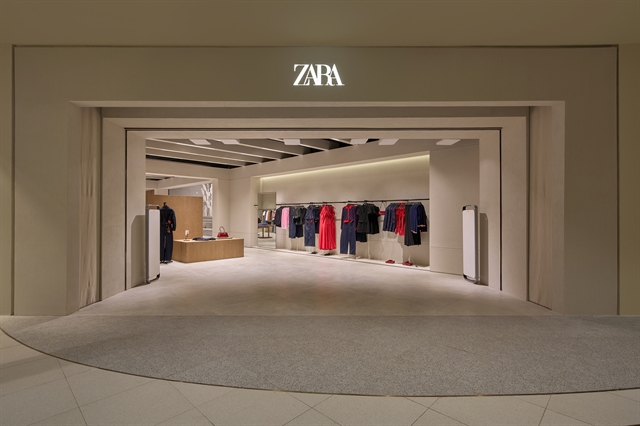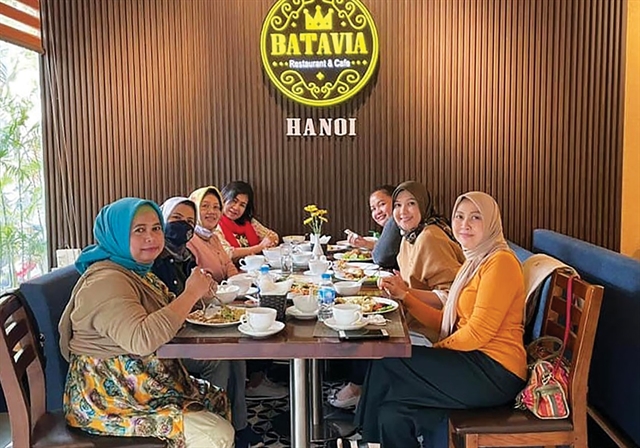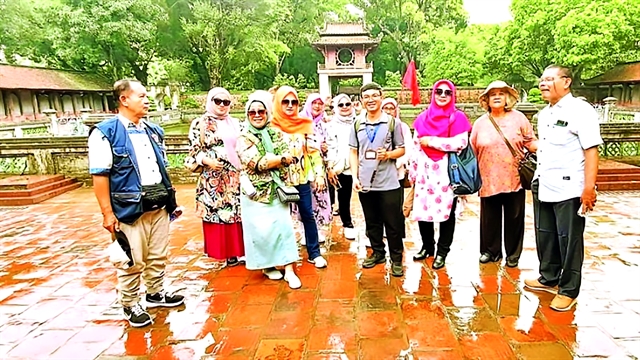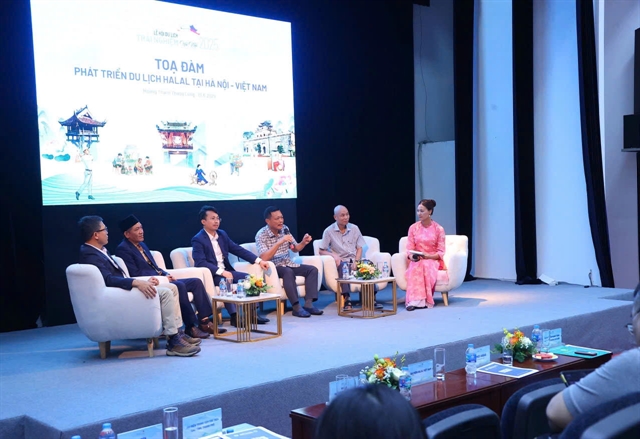 Life & Style
Life & Style

 |
| Muslim tourists enjoy cuisine at Batavia Halal Indonesian Restaurant in Hà Nội. Photo Topcom |
HÀ NỘI — With nearly 2.2 billion Muslims worldwide, the halal tourism sector presents a large opportunity for localities like Hà Nội, which has recently welcomed more and more visitors from this group.
The capital city's Department of Tourism has recently organised a seminar called Halal Tourism Development in Hà Nội - Việt Nam, with authorities and experts presenting ideas on how to capitalise on this opportunity.
High potential
Speaking at the seminar, the department's Deputy Director Trần Trung Hiếu said halal tourists hail mainly from countries with large Muslim populations like Indonesia, Malaysia, India and places in the Middle East.
This group of tourists is a market with high potential for tourism spending, but they often have specific needs compared to other groups. Catering to them requires not only entertaining experiences, but also ensuring strict compliance with religious and cultural rules.
Statistics show that global Muslim tourism spending reached more than US$220 billion in 2023, and is forecast to exceed $300 billion by 2026.
"Halal tourism offers great potential for Hà Nội and Việt Nam overall to push the development of the tourism industry," said Hiếu.
"With rapid growth and increasing demand, research and development of products and services suitable to the culture and needs of halal customers is necessary to effectively attract more Muslim tourists in the future."
Hiếu said Hà Nội's tourism sector has shown remarkable improvement in recent years, building a friendly tourism environment and trying to meet the diverse needs of international tourists, including special requirements from the Muslim community.
The city has certified halal-standard accommodation facilities, such as the Melia Hanoi Hotel and InterContinental Hanoi Landmark72. There are also several luxury hotels with separate dining spaces for halal tourists.
Hà Nội's Al-Noor mosque, built in 1885 in Hoàn Kiếm District, is also a destination for some, while many restaurants cater to Muslim guests.
 |
| Muslim tourists visit the Văn Miếu-Quốc Tử Giám (Temple of Literature) in Hà Nội. Photo nhandan.vn |
The capital is rated by international websites such as Tripzilla and Numbeo as a safe and women-friendly city. This is especially important for Muslim tourists, who often pay attention to tourism environments that respect moral and family values.
In 2024, the city drew in about 650,000 halal visitors, accounting for about 15 per cent of the total number of international visitors. In the first five months of 2025, that number has continued to grow, seeing a particular rise in tourists from India, Malaysia and Indonesia.
Plans needed
Chairman of certification organisation Halal Việt Nam Miêu Abbas said that as the political, cultural and tourism centre of the country, Hà Nội could take the lead in forming a standard halal tourism ecosystem.
"Halal tourism is not a backup option, but a strategic opportunity for Việt Nam to assert its position in the international market," he said.
"However, Vietnamese businesses and enterprises still lack basic knowledge of halal rules, as there is no standardised guidelines and expert support. The local tourism industry has not effectively reached the international Muslim market."
To solve this problem, Abbas said local authorities should develop a separate set of halal guidelines for the tourism and service industries.
He proposed organising regular training and consultation sessions for businesses and establishing a centre to promote halal tourism to connect Hà Nội with the international Muslim market.
Abbas also suggested putting Hà Nội on a global halal tourism map developed by Halal Việt Nam, which lists nearly 400 domestic enterprises and has partners in more than 57 countries.
Võ Hân, director of Phan Gia Xanh Garden in Khánh Hòa Province, said: "Halal standards are standards of safety, ethics and trust. Regular food cannot be eaten by Muslims, but halal food can be eaten by everyone.
"To exploit the halal tourism market, we have to understand Muslims. They have faith in religion and spirituality, so the more we understand them, the easier it is for us to serve them."
"Many Muslims do not like places that are too noisy and bustling, often preferring private tours that are close to nature, so rural agricultural tourism will be an experience that is very suitable for the needs of halal customers,” Hân added.
 |
| Tourism officials, experts and travel agency representatives at the seminar entitled 'Halal Tourism Development in Hà Nội - Việt Nam' on June 1 in Hà Nội. — Photo courtesy Halal Vietnam |
Việt Nam National Administration of Tourism representative Nguyễn Quý Phương said at the seminar that localities including Hà Nội should focus on building infrastructure that meets specific standards for Muslims, including basic needs such as prayer rooms, halal food and sustainable green tourism products.
The city should also build a friendly ecosystem that includes accommodation, transportation, cuisine and entertainment areas exclusively for Muslim guests.
At the seminar, participants also mentioned other issues that are hindering the development of halal tourism.
Among these are halal certification, which is still fragmented and lacks unified standards, causing difficulties for travel businesses, hotels and restaurants. Tourism infrastructure is also still modest, and the low number of employees serving this segment often lack expertise. Workers can often be confused when serving halal customers, because they have not been properly trained, according to speakers at the seminar.
“Recognising the potential of halal tourism and its specific requirements, Hà Nội has been gradually researching and implementing activities to develop products and services for Muslim tourists," said Hiếu.
"However, this is a new field, requiring close coordination between management agencies, the business community, international organisations and domestic and foreign partners.”
He committed to advise the city's People's Committee to develop policies to promote halal tourism and make Hà Nội a friendly and attractive destination for Muslim tourists.
The department will also coordinate with relevant sectors to build and upgrade halal infrastructure, develop accommodation and culinary facilities, and improve service capacity, he said. — VNS




